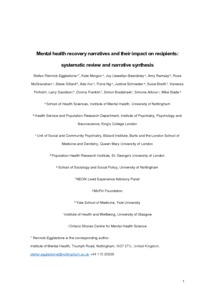Rennick-Egglestone, S;
Morgan, K;
Llewellyn-Beardsley, J;
Ramsay, A;
McGranahan, R;
Gillard, S;
Hui, A;
Ng, F;
Schneider, J;
Booth, S;
et al.
Rennick-Egglestone, S; Morgan, K; Llewellyn-Beardsley, J; Ramsay, A; McGranahan, R; Gillard, S; Hui, A; Ng, F; Schneider, J; Booth, S; Pinfold, V; Davidson, L; Franklin, D; Bradstreet, S; Arbour, S; Slade, M
(2019)
Mental Health Recovery Narratives and Their Impact on Recipients: Systematic Review and Narrative Synthesis.
Can J Psychiatry, 64 (10).
pp. 669-679.
ISSN 1497-0015
https://doi.org/10.1177/0706743719846108
SGUL Authors: Gillard, Steven George
![[img]](https://openaccess.sgul.ac.uk/110895/1.hassmallThumbnailVersion/NEON%20_5%20CJP%20accepted%20version.pdf)  Preview |
|
PDF
Accepted Version
Available under License ["licenses_description_publisher" not defined].
Download (578kB)
| Preview
|
Abstract
OBJECTIVE: Mental health recovery narratives are often shared in peer support work and antistigma campaigns. Internet technology provides access to an almost unlimited number of narratives, and yet little is known about how they affect recipients. The aim of this study was to develop a conceptual framework characterizing the impact of recovery narratives on recipients. METHOD: A systematic review of evidence about the impact of mental health recovery narratives was conducted. Searches used electronic databases ( n = 9), reference tracking, hand-searching of selected journals ( n = 2), grey literature searching, and expert consultation ( n = 7). A conceptual framework was generated through a thematic analysis of included articles, augmented by consultation with a Lived Experience Advisory Panel. RESULTS: In total, 8137 articles were screened. Five articles were included. Forms of impact were connectedness, understanding of recovery, reduction in stigma, validation of personal experience, affective responses, and behavioural responses. Impact was moderated by characteristics of the recipient, context, and narrative. Increases in eating disorder behaviours were identified as a harmful response specific to recipients with eating disorders. CONCLUSIONS: Mental health recovery narratives can promote recovery. Recovery narratives might be useful for clients with limited access to peers and in online interventions targeted at reducing social isolation in rural or remote locations, but support is needed for the processing of the strong emotions that can arise. Caution is needed for use with specific clinical populations. Protocol registration: Prospero-CRD42018090923.
| Item Type: |
Article
|
| Additional Information: |
Rennick-Egglestone, S; Morgan, K; Llewellyn-Beardsley, J; Ramsay, A; McGranahan, R; Gillard, S; Hui, A; Ng, F; Schneider, J; Booth, S; et al., Mental Health Recovery Narratives and Their Impact on Recipients: Systematic Review and Narrative Synthesis., Canadian Journal of Psychiatry (Vol 64, Issue 10) pp. 669-679. Copyright © 2019 (The Author(s)). DOI: 10.1177/0706743719846108 |
| Keywords: |
impact, memoirs, mental health, recovery narratives, recovery stories, 11 Medical And Health Sciences, 17 Psychology And Cognitive Sciences, Psychiatry |
| SGUL Research Institute / Research Centre: |
Academic Structure > Population Health Research Institute (INPH) |
| Journal or Publication Title: |
Can J Psychiatry |
| ISSN: |
1497-0015 |
| Language: |
eng |
| Dates: |
| Date | Event |
|---|
| 1 October 2019 | Published | | 2 May 2019 | Published Online | | 31 March 2019 | Accepted |
|
| Publisher License: |
Publisher's own licence |
| Projects: |
|
| PubMed ID: |
31046432 |
 |
Go to PubMed abstract |
| URI: |
https://openaccess.sgul.ac.uk/id/eprint/110895 |
| Publisher's version: |
https://doi.org/10.1177/0706743719846108 |
Statistics
Item downloaded times since 30 May 2019.
Actions (login required)
 |
Edit Item |



